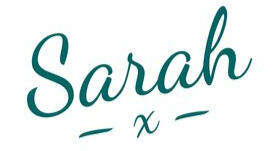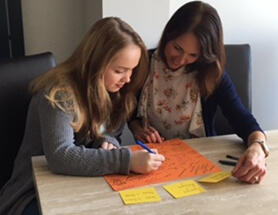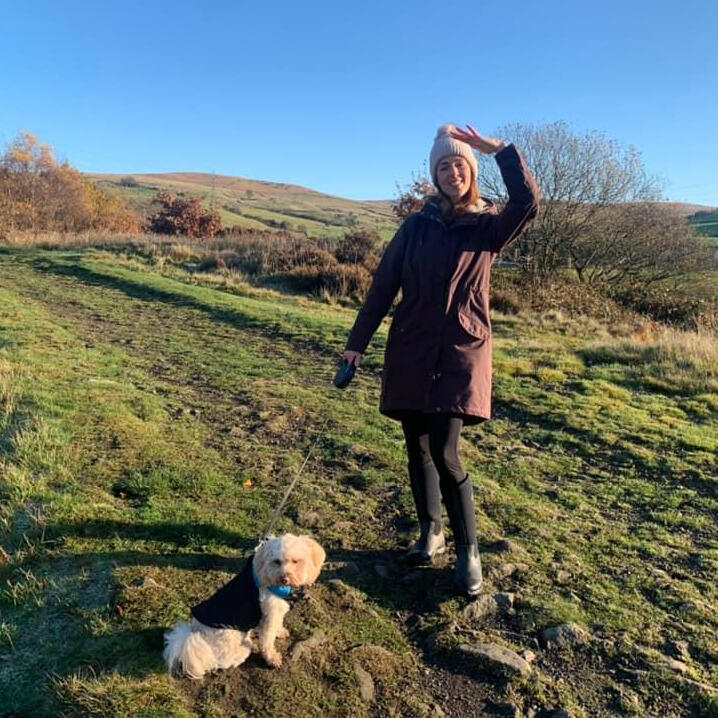French tuition for all ages — supportive, engaging and tailored to you.
Whether your child is working towards GCSE or A Level, or you're an adult looking to refresh your French, my lessons are designed to make learning enjoyable, effective and rewarding.

I offer personalised online and face-to-face tuition for teens who need extra support to reach their potential, as well as friendly and encouraging in-person and online lessons for adults. In every session, building confidence and enjoying learning is just as important as making progress.
➡️ Learn more about GCSE & A Level tuition
➡️ Learn more about adult tuition
➡️ Book a free consultation to find out more about French tuition with me

About Sarah
I have always had an unexplained curiosity for languages from being very little. I was desperate to start French lessons at secondary school and from my first class, my love for French and France kept growing. I learned German and also a little bit of Russian but it was French that captured my heart. I feel so lucky to now be able to share my passion for this beautiful language on a daily basis and with so many people. Learning French has enriched my life and taught me so much in so many ways and I hope that everyone who works with me will feel the same way too.
To find out more about Sarah’s background, click here
Adult Tuition
Learning French as an adult is a brave and rewarding step, no matter what stage you’re starting from. Having worked with adult learners for many years, I understand both the high points and the challenges of the process. If you are considering lessons, then that in itself is already a wonderful first step!
I’d be delighted to chat with you about your goals and how we can work together to achieve them. I’ll take the time to listen carefully and together, we will create a tailored plan that helps you make real progress, grow in confidence and enjoy the experience of learning.
I offer one-to-one tuition online and face-to-face, as well as the option to learn with a partner or where possible, in a small group of three or four. You can choose the setting that feels right for you.
➡️ Book a free consultation to find out more about French tuition with me
PRICES
£40 per hour (pay-as-you-go)£190 for a block of 5 x 1 hour lessons£350 for a block of 10 x 1 hour lessons
about sarah
After completing my BA Joint Honours in French & English Literature at The University of Leeds in 1998, I moved to Toulouse where I lived and worked for nearly 5 years. I worked for a language learning consultancy that took me all around France and gave me the privilege of working with some very senior business people. It was a bit nerve-racking at times but amazing! The pull of home eventually became too much and in 2003, I returned to Oldham to work for the borough’s Secondary School Improvement Team. I missed using my French so much that in 2010, after the birth of my second son, I did my PGCE and was fortunate to teach A level French alongside my studies at the local sixth form college - where I had studied too! I loved my job here but in 2016, I decided to branch out on my own to try to gain a healthier work life balance. Since then, I have continued teaching French to A Level and GCSE students, as well as to adults ranging from beginners to advanced learners.
When I’m not teaching, reading about teaching or preparing resources for my classes, you are most likely to find me on the side-lines of football matches watching my sons, walking our gorgeous dog or enjoying a wine with my husband and our friends.
➡️ Learn more about GCSE & A Level tuition
➡️ Learn more about adult tuition
➡️ Book a free consultation to find out more about French tuition with me
Reviews
I’ve been lucky enough to be tutored by Sarah for past two years for my A level French.
She has always supported me throughout and encouraged me to push myself to do the best that I can. She has helped to hugely increase my confidence in my ability, which has also helped me gain more self-esteem and pushed me to believe in myself.
Her knowledge of the French language and culture and also all of the resources that she provides have been incredibly useful and allowed me to learn skills quicker than when I was in classes in college.
I am so grateful for all of the time and help Sarah has given me and I don’t hesitate at all in recommending her to all students!
Emily, A-Level student
For anyone that has a child who is struggling with their French GCSE, I can wholeheartedly recommend Sarah. She is the most lovely and patient tutor who meets the learner where they are. Sarah worked with my daughter who was struggling with her confidence in her ability to achieve her GCSE French. Through regular assessment she knew exactly what her strengths were. Sarah used this to focus the sessions on the areas of learning that most benefited her. She used a variety of teaching and assessment methods to keep the sessions varied and most importantly, to keep them fun and enjoyable.
The teaching of languages in schools is often quite disjointed, and the student has no control over the pace of delivery. We found the extra sessions with Sarah helped her to feel more confident as she was encouraged to highlight the content she had struggled with. My daughter went on to achieve a grade 7 (A) in her French GCSE, she was so happy, and so was I 🎉
Thanks again for being so supportive ❤️
Liba, Parent of GCSE pupil
I have been going to these classes since September 2018. I can honestly say it’s a joy to be in one of Sarah’s classes. I am an intermediate beginner which means I had school French which I failed the exam and some vocabulary I’d picked up online. Now I have some perfect, imperfect and simple future tenses and lots more vocab. I have even plucked up courage to speak a few sentences in conversation. The lessons are fun and Sarah engages with all her learners. She never picks on people unless she is confident they can answer the question. Each lesson is well prepped and she uses a variety of learning methods to appeal to different learning styles. Sarah has a number of classes from new learners to advanced conversations. Highly recommended.|
Heather Ward
6 Ways to Help Your Child Succeed in Their French GCSE
Even if you don’t speak French!
Learning French at GCSE can be incredibly rewarding and it can open so many doors for your child. It’s a challenging subject and that’s exactly why colleges, universities and employers value it. Success in French shows much more than the ability to communicate in another language – it demonstrates academic skill, dedication and determination.
And here’s the good news: you don’t need to be fluent in French to help your child succeed! So, how can you help?
1. You Can’t Cram a Language! ⏲️
Languages are best learned in small, regular chunks; little and often! Encourage your child to spend 15 minutes, 2–3 times a week revising vocabulary and short structures.
Top Tip! Encourage your child to make flashcards instead of just reading through lists –they are far more effective and will be very useful to return to for long-term revision. And try to avoid just writing down single words – write short phrases. Vocab is much easier to remember in context. You can then use the cards to test your child! Don’t worry if you have to pronounce a word in French. Your child may enjoy correcting you ☺️- and if not, you can use online tools to check pronunciation together.
2. Go Backwards as Well as Forwards ⬅️➡️
Encourage your child not to just revise the latest topic. Your child will cover a lot of content throughout the course so encourage your child to regularly revisit vocabulary and grammar from 1 month, 3 months or even 6 months ago. This is called retrieval practice – it strengthens memory and speeds up recall. It will also highlight useful language that can be transferred across different topics.
Top Tip! Make a retrieval box: pop flashcards inside and regularly pull some out for quick-fire testing on a wide range of topics.
3. Ask “what do you think?” 💡
For speaking and writing, your child needs to give opinions, describe experiences and share ideas – all in French. Even if their vocabulary and grammar are excellent, they’ll struggle if they have nothing to say.
Top Tip! Ask their opinion on syllabus topics such as:
What are the pros and cons of a school uniform?
How important is a healthy lifestyle?
What are the qualities of a good friend?
What are your future plans?
The more they’ve thought about these topics in English, the easier it will be to express them in French.
4. Level Up Their Listening 🎧
The listening part of the exam can often be seen as the hardest part to prepare for but regularly listening to French is so beneficial and can make a huge difference.
Top Tip! Look for French-speaking YouTubers or social media accounts, listen to French music or watch a French TV show. You could even pop on the subtitles and watch a show together. The aim isn’t to understand every word – it’s to get used to the sounds and rhythm of the language which is so valuable.Check if the school subscribes to any online platforms where listening passages are available. Even if the choice is limited, listening to the same passage several times is not a waste of time! Repeated listening is very beneficial.
5. Make Reading Active 📖🖊️
Reading isn’t just for comprehension questions – it’s a goldmine for improving speaking and writing!
Top Tip! Once your child has completed a reading activity, encourage them to reread the passage and to highlight useful phrases or sentence structures they can adapt in their own work. This isn’t cheating – it’s modelling, which is such a great way to embed as well as develop vocabulary and structures.
6. Practise Past Papers✍️
Past papers will help your child to get used to and understand the format of the exam which will build confidence. It will help improve time management and it is a great way for your child to identify their key strengths and also, their areas for development.
Top Tip! Encourage your child to not just focus on the marks that they achieve on a past paper, but to look for any patterns in their performance and to carefully read any feedback that they receive. This will really help them to plan their revision more strategically.
You don’t need to speak French to be a great support for your child! Consistent and targeted encouragement and support will make such a huge difference.
Bon courage!
One Last Tip! It’s helpful to know which examination board your child is studying under. You can ask your child or check with their school. All boards assess the same four key skills - listening, speaking, reading, and writing - but specific topics vary between exam boards.
➡️ Learn more about GCSE & A Level tuition
➡️ Book a free consultation to find out more about French tuition with me
6 Ways to Help Your Child Succeed in Their French A-Level
Even if you don’t speak French!
Studying French at A-Level will open so many doors for your child. Universities and employers highly value the skills your child will gain from this course including communication, research, critical thinking, cultural awareness and of course, an advanced proficiency in French.
The A-Level course is rich, stimulating and intellectually demanding with a focus on linguistic sophistication and an in-depth study of French and Francophone culture. If your child has chosen to study French at A-Level then it is likely that they are already very motivated and independent but you can still play a supportive role, even if you haven’t studied French yourself. Here’s how!
1. Go Backwards as Well as Forwards ⬅️➡️
A-Level French is linear meaning that all the exams are taken at the end of the 2-year course. Your child will cover a lot of content and it is tempting to focus only on current topics. Encourage your child to regularly revisit vocabulary, structures and topics from 1 month, 3 months or even 6 months ago.
This is called retrieval practice – it strengthens memory and speeds up recall. It also highlights language that can be transferred across different topics which in turn, will embed these structures as they are being used more frequently.
Top Tip! Make a retrieval box. Pop flashcards of vocab and structures (and ideas!) inside the box and regularly pull some out for quick-fire testing.
2. Master the Grammar 📝
Check how your child feels about the grammar that they have studied and are currently studying. Mastering grammar early is worth it. It is expected that the structures introduced at GCSE are known so that these can be developed further so having a solid foundation will really help. It frees up mental space allowing your child to focus more on what they want to say rather than pausing to think about how they can say it.
Top Tip! It may seem dull but repetition is key to help structures stick! For example, if your child is struggling with the Conditional Tense, using an online platform like “languagesonline.org.uk” is excellent for practice. Once confident with the structure, your child can then take this further by creating their own sentences about a topic that they have studied using the Conditional Tense (and then these can go in the retrieval box!)
3. Make Reading Active 📖🖊️
Reading isn’t just for comprehension questions – it’s a goldmine for improving speaking and writing, not just for vocabulary and structures, but for ideas and deepening understanding too.
Top Tip! Once your child has completed a reading activity, encourage them to reread the passage and to highlight useful phrases or sentence structures they can adapt and use in their own work. Ask them if there are ideas that they can use to develop their own opinions and to build their own arguments. This isn’t cheating! It’s modelling, which is such a great way to embed as well as develop vocabulary, structures and ideas.
4. Ask “what do you think?” 💡
For A-level French speaking and writing, your child must share, discuss and justify their opinions on the topics and texts / films that they have studied; and they will have to do this in a sophisticated way. Strong vocabulary and complex grammar are essential but they’re not enough on their own. Your child needs to develop their thoughts on all the key themes such as family, education, politics and cultural life.
Top Tip! Engage your child in discussion. Ask about topics they are studying and encourage them to explain their opinions and reasoning in English. For example:
Should regional traditions be preserved even if they conflict with modern lifestyles?
Has social media made politics more accessible or created more divisions?
Do changing family structures reflect progress or a loss of traditional stability?
Should freedom of speech have limits when it risks spreading harmful or false information?
The more time your child spends thinking about these topics in English first – forming clear viewpoints, justifications and considering examples– the easier it will be to express these in French and truly showcase their excellent language skills.
5. Level Up Their Listening🎧
The listening part of the exam can often be seen as the hardest part to prepare for but regularly listening to French is so beneficial and can make a huge difference.
Encourage your child to listen to French Podcasts, follow French-speaking YouTubers or social media accounts, listen to French music or watch French TV shows. You could even pop on the subtitles and watch a show together. The aim isn’t to understand every word – it’s to get used to the sounds and rhythm of the language which is so valuable and which actually helps to improve pronunciation.
Top Tip! Make daily listening a habit – even just short bursts!
6. Practise Past Papers✍️
Past papers help your child to get used to and understand the format of the exam which will build confidence. It will help improve time management and it is a great way for your child to identify their key strengths and also, their areas for development.
Top Tip! Encourage your child to not just focus on the marks that they achieve on a past paper, but to look for any patterns in their performance and to carefully read any feedback that they receive. This will really help them to plan their revision more strategically.
You don’t need to speak French to be a great support for your child! Consistent and targeted encouragement and support will make such a huge difference.
Bon courage!
One Last Tip! It’s helpful to know which examination board your child is studying under. You can ask your child or check with their school. All boards assess the same four key skills - listening, speaking, reading, and writing - but specific topics vary between exam boards.
➡️ Learn more about GCSE & A Level tuition
➡️ Book a free consultation to find out more about French tuition with me
Contact Me
If you have any questions then please contact me on 07919 072135 or using the form below
Sign Up
For exercises, articles and blog posts to improve your French!
GCSE & A-Level Tuition
Learning French at GCSE or A Level can be incredibly rewarding and can open so many doors for your child. If you feel they need additional support to truly reach their potential and achieve the grades they deserve, then my tailored tuition can make all the difference.
Experienced, qualified, and passionate about teaching French
With over 20 years of experience in education, I bring a deep understanding of language teaching across all levels. I am a fully qualified A-Level French teacher and have taught in both the UK and France, working with learners from a wide range of backgrounds — from school students to senior business professionals.After completing a BA Joint Honours in French & English Literature at the University of Leeds, I spent five years living and working in Toulouse, delivering language training across France through a specialist consultancy. On returning to the UK, I worked with the Secondary School Improvement Team in Oldham before completing an in-service PGCE and teaching A-Level French at Oldham Sixth Form College.Since 2016, I’ve run my own teaching business, offering expert tuition to GCSE, A Level and university students, as well as delivering engaging and supportive classes for adult learners.
Free Consultation
Before starting to work with your child, I offer a free telephone or Zoom consultation of up to 30 minutes to gain a clear understanding of your child’s individual needs. This allows me to tailor each lesson to support their learning effectively. My priority is always to ensure your child makes meaningful progress while enjoying the sessions and growing in confidence.During this free consultation, we can discuss the frequency and duration of the tuition and whether we will work online or face-to-face. Some children may only need a couple of sessions to develop a deeper understanding of a specific topic or grammatical structure whereas some children may need weekly sessions to consolidate and grow their knowledge and understanding.🇫🇷 Book a free consultation to find out more about French tuition with me
PRICES
£40 per hour (pay-as-you-go)£190 for a block of 5 x 1 hour lessons£350 for a block of 10 x 1 hour lessons



